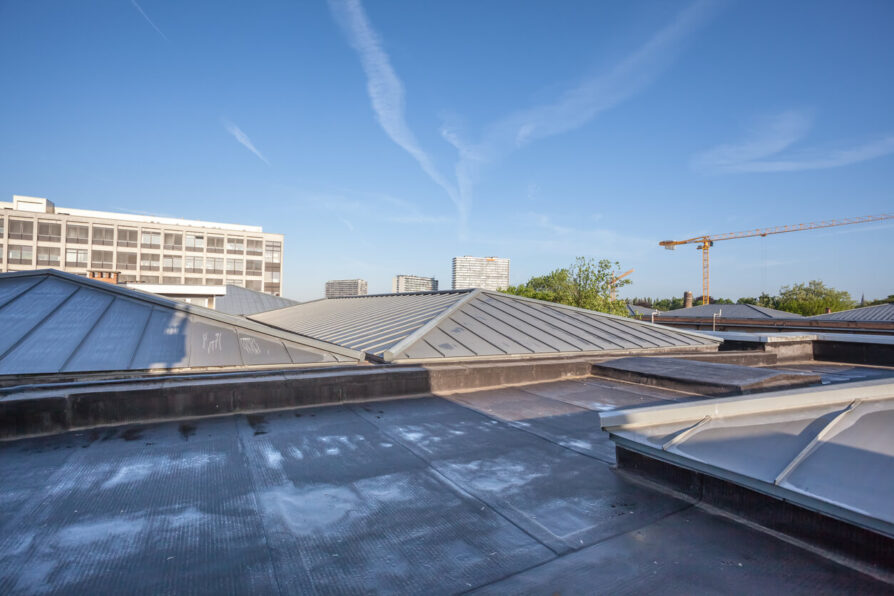From roofing shingles to layers of tar and rock, business owners have quite a few types of roofing materials available. Some types have been around for more than a century, and others have only been in use for a few decades, but they are all designed to meet the stringent demands of commercial businesses. Because there are so many options available, it is a good idea to get to understand what is available and where each type performs best. Here is a quick description of the most popular types of commercial roofing being used today, including any major benefits or disadvantages inherent to each material.
1. Built-Up Roofing (BUR)
Composed of alternating layers of tar and gravel, built-up roofing membranes have been in use for decades. It is priced comparably to roofing shingles and has a great reputation for durability and strength. On the other hand, BUR membrane roofs require a strong underlayer to support the weight, and the durability of the roof is ultimately determined by the thickness and number of layers involved. The main drawbacks of BUR membrane roofs are the short life of 20 only a decade or so, and the difficulty of locating leaks when they happen.
2. Metal Roofing
Metal roofing has a number of benefits and will last for 20 to 30 years. It is one of the best types of commercial roofing available and can be installed in a range of styles and colors. Metal will corrode or rust over long periods, but the installation process uses screws and underlayment to minimize weathering and reduce noisiness in heavy rains.
Metal roofing may be one of several types of metal, including aluminum, steel, tin, and copper. Modern metal tiles can resemble other types of roofing as well, including simulating the look of tiles roofs. For versatility and price, a metal roof is very appealing to business owners.
3. Silicon Spray-On
Spray-on roofing has been used in commercial settings for more than 50 years and is available as a silicon spray or– more commonly– a specially formulated polyurethane. After application, the material expands and hardens, forming a water-resistant barrier that is also a great insulator against temperature and sound. This type of roofing is almost always applied on top of an existing roof and should be examined for cracks or leaks semi-annually. As with a built-up roof, leaks can be difficult to locate and may require replacing an appreciable surface area when it is repaired
4. Thermoset EPDM Roof Membrane
Ethylene Propylene Diene Terpolymer, usually referred to as EPDM, is a synthetic, rolled material that is generally available in either white or black. It is resistant to harsh weather, but EPDM is thin and can be easily punctured by falling tree limbs or frequent rooftop [ traffic. EPDM is economical and functional, but it is not as durable as most roof materials. If cost is a primary concern, EPDM is an easily-installed solution that won’t break the bank, but you can expect it to need repair or replacement 15 to 20 years down the line.
5. Thermoplastic PVC & TPO Roof Membranes
This type of commercial roofing has a lot to offer, including heat resistance, climate tolerance, and longevity. It provides protection against UV light and is puncture-resistant. This is one of the more lightweight roofing materials and provides an excellent roof structure for the price. The drawback with PVC and TPO is that it is available from many manufacturers, some with lower quality standards than others.
If you are considering PVC/TPO roofing, talk with your roofing contractors about the source and quality of the materials they use. The major benefit of this type of commercial roofing is that it is tolerant of most climate conditions, so you won’t have to worry about cracking or peeling in freezing temps or sagging and separating during extreme summer heat.
6. Green Roofing
Eco-friendly roofs are becoming more popular in recent years, but have the same drawbacks as BUR membranes. The weight of organic material is a tremendous burden for the understructure and typically requires additional support. A green roof requires a great deal of maintenance as well. While this is a viable type of commercial roof, maintaining it can be prohibitively expensive. On the plus side, a well-built green roof will last for up to 50 years and may be eligible for incentive programs in some areas.
7. Shingle Roofing
Shingle roofing has always been an affordable option for commercial roofs, but this type of material also has limitations and drawbacks. Because tiles have to be handled individually, it takes longer to install, and some types of tile– asphalt, for example– are only warranted for around 20 years. Keep in mind that you can also use ceramic or metal tiles that imitate the look you are trying to achieve, but you’ll pay a higher price point to do it. One of the best traits of asphalt shingles is that minor damages can be repaired without replacing a large section of your roof, and that can save a lot of future repair bills.
The Role of Qualified Contractors
Choosing the right contractor for your roofing project is just as important as selecting the correct material. In fact, if you are not sure of what type of roof to get, the best place to start is with a roofing contractor who knows the ropes, understands the differences, and can advise you about what works best in your situation. Look for a roofing company that is licensed and insured, has good online reviews, and has an established work history in your area. All contractors are required to be licensed and insured in California, and many municipalities have code enforcement regulations that only a licensed contractor can perform.
The roofing material that is right for you depends on a number of factors. Location, age, and desired appearance are all important, along with the type of building, expected longevity of the roof, and what you are prepared to invest in it. There is not a one-type-fits-all commercial roof solution, but there is a perfect solution for every roofing demand.
Peak Roofing & Exteriors
If you’re looking for an honest and experienced team that can handle your metal roofing project in Northwest Arkansas, Northern Louisiana, or West Texas, look no further. Peak Roofing & Exteriors can take care of your home or business with quality and integrity. Contact us today and book a FREE inspection!

